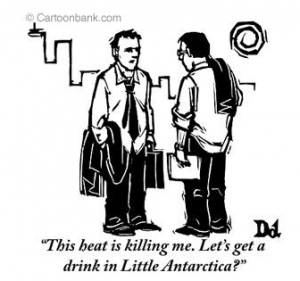In this editorial, In Denial of Climate Change, we learn about a perspective that’s being taken by some Republican candidates.
The candidates are not simply rejecting solutions, like putting a price on carbon, though these, too, are demonized. They are re-running the strategy of denial perfected by Mr. Cheney a decade ago, repudiating years of peer-reviewed findings about global warming and creating an alternative reality in which climate change is a hoax or conspiracy.
This is a perspective that’s not uncommon among many people across the USA. I wonder, then, what we have to do to demonstrate that we, indeed, have affected — and continue to affect — Nature?
These elections (November) and this mediated hype without debate comes at a time when we’re witnessing the questioning the “value,” “worth” and significance of the Humanities in colleges and universities. For instance, there is a debate, ongoing, in Do Colleges Need French Departments.
In her response, Martha Naussbum argues that,
Cuts in the humanities are bad for business and bad for democracy. Even if a nation’s only goal were economic prosperity, the humanities supply essential ingredients for a healthy business culture.
Nations such as China and Singapore, which previously ignored the humanities, are now aggressively promoting them, because they have concluded that the cultivation of the imagination through the study of literature, film, and the other arts is essential to fostering creativity and innovation. They also have found that teaching critical thinking and argumentation (a skill associated with courses in philosophy) is essential in order to foster healthy debate inside a business world that might too easily become complacent or corrupt.
We in the U.S. are moving away from the humanities just at the time that our rivals are discovering their worth. But a healthy business culture is not all that life in America is about.
What might be the connections between Republican rejection of man-made climate change, the media hype without debate or dialog, and the willingness of citizens to accept the notion that climate change is happening — and has happened — outside our influence?
